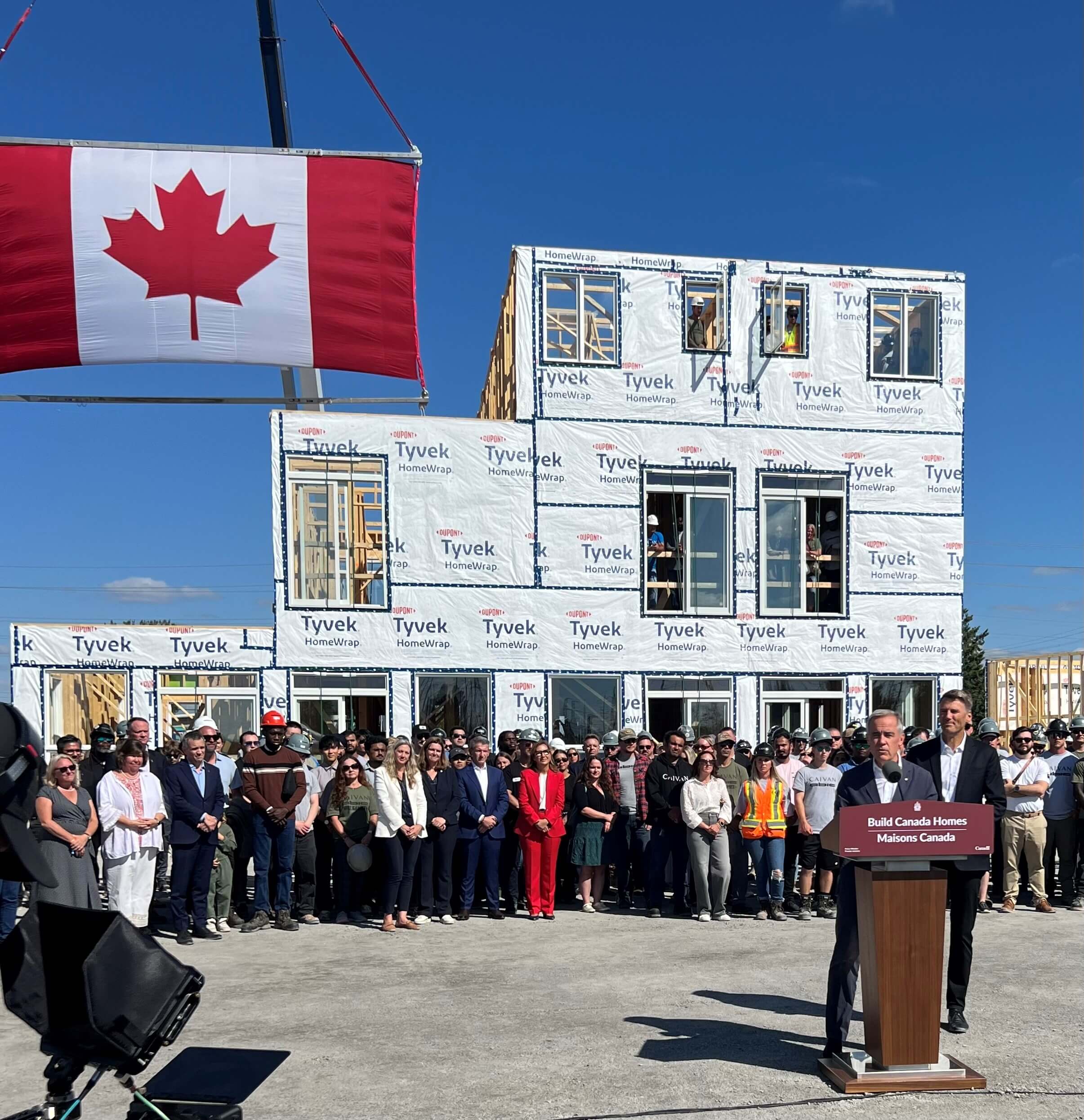Build Canada Homes
Build Canada Homes
September 15, 2025 – Government launches Build Canada Homes
On September 14, the federal government launched Build Canada Homes (BCH), a new federal agency that will focus on creating more affordable (i.e. non-market) housing to fight homelessness and provide housing for low-income households, leveraging public lands.
The federal government will capitalize BCH with an initial $13 billion. To begin, a total of 4000 homes will be built on six federal land sites in Dartmouth, Longueuil, Ottawa, Toronto, Winnipeg, and Edmonton, with additional capacity of up to 45,000 units across the portfolio. (Read the government’s press release for details on all aspects of the BCH announcement here).
Having provided extensive feedback on the BCH concept, CHBA CEO Kevin Lee was invited to attend the announcement and engage with government officials at a gathering afterwards, giving him a chance to dialogue on BCH and CHBA’s priorities with Minister Robertson, other MPs and staffers, departmental executives, and the newly appointed CEO of BCH, Ana Bailão.


What members need to know about Build Canada Homes
Further details on the BCH, including financing details, will be announced over the coming months, and CHBA will communicate with members as relevant information is released. Below are the key points for members on what is currently known.
- The BCH is not about market-rate homes: It is important to note that BCH will focus on affordable, non-market housing. While this is an important part of the market – and can provide opportunities for CHBA members in that space – BCH will not address market-rate housing (for homeownership or rent). As such, CHBA will keep reiterating the need for policy change for market-rate housing, including:
- Finalizing the parliamentary process to have the GST exemption for first-time buyers take effect as soon as possible, given the additional drag the announcement and delay has caused in the market;
- Expanding the GST exemption to all buyers, secondary suites, ADUs (all of which of course also apply to substantial renovations as well);
- Continuing to address municipal development taxes, zoning, permitting delays, etc., as well as provincial and federal red-tape issues;
- Addressing ever increasing costs driven by building codes and standards;
- Addressing labour shortages by securing more workers for residential construction through both domestic sources and immigration;
- and more - see CHBA’s pre-budget submission here.
- The government has committed to partnering with industry: CHBA has emphasized the importance of any BCH activity partnering with the private sector to actually develop land and build the housing units, and the Prime Minister emphasized this partnering with industry in his remarks.
- Workforce challenges remain a concern: It will also be important that, beyond BCH, the government supports getting more Canadians to choose residential construction as a career and improve the immigration system to secure more workers to actually build homes, both for BCH and market housing. If/as the market turns around, augmented by BCH, the industry already faces a labour shortage and will not have enough workers to meet demand.
- Productivity and de-risking investment must extend beyond the BCH: Related to labour and productivity, BCH will focus extensively on factory-built solutions. While these can be an important part of productivity gains in the sector, there are many challenges with scaling these that go beyond the BCH focus of non-market housing. CHBA’s Sector Transition Strategy provides extensive insight on the barriers and policy changes needed to support more factory-built housing, and items like innovative financing solutions for modular must go beyond only BCH projects and extend to market housing as well. For example, BCH is committing, per CHBA recommendations, to provide de-risking and other financing supports for BCH, but CHBA has always recommended that the solutions must be provided for market-rate housing as well for the sector to adopt factory-built solutions at scale.
- High-rise housing will be included: It is also worth noting that factory-built solutions will be appropriate for low- and mid-rise, but high-rise housing, which will be needed in many cases, does not lend itself to factory-built approaches. CHBA confirmed that high-rise housing will be supported by BCH as well, without the same emphasis on factory-built.
While BCH will support many Canadians in need of non-market housing, to support the middle class and Canadians’ ability to attain market housing that they can afford (for rent or ownership), continued policy change at all levels of government to support affordability and supply of market housing will be required to reach the targets set by the federal government to double housing starts to 500,000 per year, as BCH alone cannot do this.
